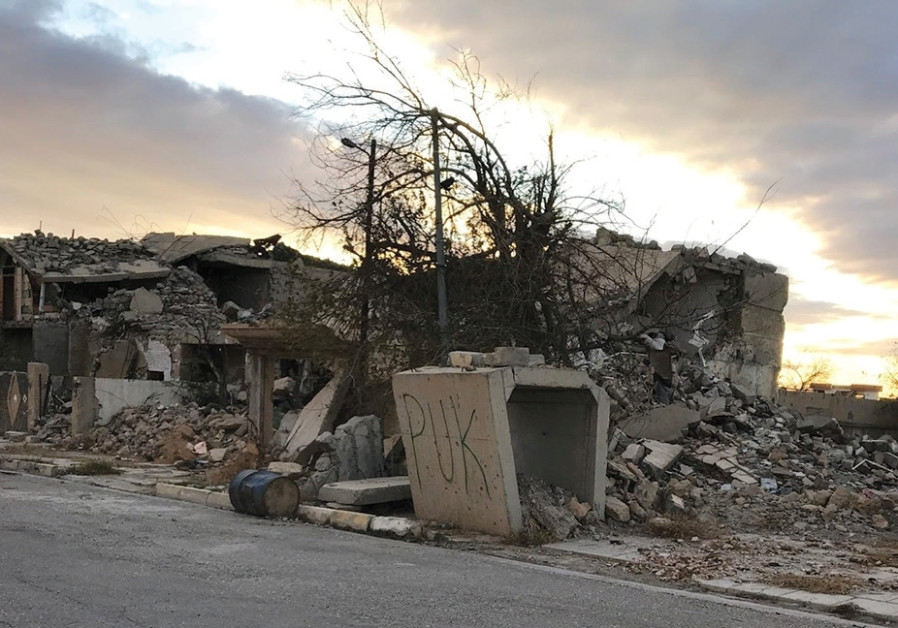Now try to answer this question: Should Israel, the state that rose from the ashes of Holocaust recognize and acknowledge a genocide when it happens to other people?
DESTROYED BUILDINGS in the city of Sinjar. There has been no reconstruction of Yazidi communities.. (photo credit: REUTERS)
Mass graves where unidentified men, women and children are lying together are being discovered near Mosul, Kirkuk and Sinjar mountain. The horrific discoveries of these nameless victims remind us all of what have happened in Iraq four years ago, when the world was looking the other way.
Back in 2014, the ancient Yazidi community that survived Persian, Arab and Ottoman empires was brutally attacked by the terrorists of Da’esh (ISIS). Their houses were burned with their inhabitants inside, small children were slaughtered with horrific sadism, men were shot and thrown to mass graves and women were turned into sex slaves. All that just for being Yazidi.
Sadistic Dae’sh death squads didn’t need any other reason; according to their violent and crazy ideology, any group of people who didn’t belong to three monotheistic religions was supposed to be exterminated, cleansed, destroyed. UN general secretary Boutrous Ghali once said that people didn’t believe a genocide can be performed with a machete (he was talking about the massacre in Rwanda). Apparently, a genocide can be performed even during the Internet era, when everyone is watching it on their smartphones.
Now try to replace the word Yazidi with the word Jew. Imagine these old black and white photos that were taken sometime between 1939 and 1945 coming to life somewhere else a couple of hours’ flight from Tel Aviv. Visualize the murderers crushing skulls, burning villages and killing people and imagine helpless Jews there instead of helpless Yazidis. Da’esh ideologists believed they were not worthy enough to exist, their goal was to wipe this ethno-religious group from the face of the earth and they made a vicious plan that was executed meticulously.
Now try to answer this question: Should Israel, the state that rose from the ashes of Holocaust recognize and acknowledge a genocide when it happens to other people? Or should it just concentrate on its own survival and let go of moral principles such as “Never again?” Not so long ago, I thought I knew the answer. After my bill that called to recognize the genocide of the Yazidi people was rejected by the coalition, I no longer certain of that.
The idea behind the bill was simple. Israel will recognize the genocide of the Yazidi people and mark this day on August 3, a day that was proposed by Yazidi activists and human rights groups. I submitted the bill to the secretariat of the Knesset almost a year ago, soon after I met Nadia Mourad, a young woman who escaped the Da’esh hell and survived the horror so she could tell the world about what happened to the Yazidis. Nadia came to Israel with the help of Israid group and together we organized a special event at the Knesset. A few members of the opposition came, but not even one MK from the coalition showed up. When I asked some MKs why didn’t they attend, they told me that they do not know who the Yazidis were.
The draft bill was later signed by Likud MK Yehuda Glick and by a few opposition members from various parties. Justice Minister Ayelet Shaked expressed some interest in this bill and spoke numeral times about the necessity of building bridges between Israel and the Kurdish people, but eventually the minister’s committee for legislation decided to vote it.
After the bill was presented, deputy foreign minister Tzipi Hotovely said that she is deeply sympathetic to the Yazidis, and indeed it’s important to acknowledge this genocide, however, “the government didn’t have enough time to study it.” Another reason mentioned was the UN. “The UN hasn’t yet recognized the genocide of the Yazidis” said Hotovely, as though Netanyahu’s government religiously followed and executed everything that UN said and did. And since everyone in Knesset knows how fast bills that are being pushed from “above” are being approved (sometimes within a couple of weeks after they are put on Knesset table), the “there was little time to study the bill” pretense just doesn’t hold water.
What happened this week at the Knesset was no small drama. It was a kind of a litmus paper test of what Israel actually is all about and on what moral ground it stands. Unfortunately, the government failed this test. The bill was rejected – but that doesn’t mean that the fight for what is right is over.
We owe it to the broken and suffering Yazidi community and we owe it to ourselves. Hopefully, the bill will be presented again in the Knesset in six months, and the government – the current one or the next one – will have to choose again, whether to stand with those who crying for help and beg for recognition, or look the other way, just like everyone else did 75 years ago.
The author is a member of Knesset for Zionist Union.




@ inna1kre:
Inna,
I don’t understand your comment. What do you think is unbelievable?
Unbelievable… Why?!